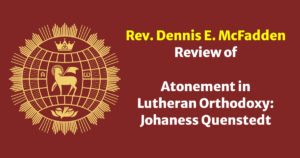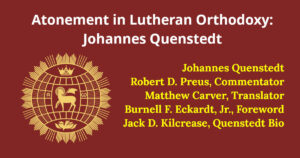by Rev. Dennis E. McFadden, Pastor ordained in the Lutheran Church – Missouri Synod
Vicarious Satisfaction in Lutheran Catechisms, Confessions, and Hymns by attorney and Lutheran layman TR Halvorson fulfills the promise of its title. In a spare 160 pages Halvorson offers examples to prove the centrality of vicarious atonement in the theology of confessional Lutheranism.

Halvorson writes at a time when critics outside of Christianity, mainline theologians, trendy evangelical writers, and even some Lutherans have taken pen to decry the notion of vicarious satisfaction. Whether opting for one of the newer “bloodless atonement” theories or simply claiming that “the cross would not have been necessary had sinners only believed that God can and does just “up and forgive” (iii) the ground has been shifting against the once dominant view held by a variety of Christian bodies.
Writing as a “confessional Lutheran” pledged to the accuracy of the Lutheran confessional symbols (i.e., the documents contained in the Book of Concord), Halvorson sees the current trend as nothing short of a denial of Augsburg Confession, Article V, paragraph 101: “We are justified only when we receive Christ as the Atoning Sacrifice and believe that for Christ’s sake God is reconciled to us. Neither is justification even to be dreamed of without Christ as the Atonement.”
Vicarious satisfaction—involving the elements:
- God’s justice, Law, verdict, judgment, condemnation, and curse
- substitution of Christ for us
- active obedience of Christ
- passive obedience of Christ
- imputation, counting, reckoning of our sins to Christ and Christ’s righteousness to us
- satisfaction
does not exclude the Christus Victor theme but “explains it and give it its ground” (3). In support of this theme, Halvorson marshals the writings of theologians such as Luther, Theodore Dierks, Junius Remensnyder, Francis Pieper, Jack D. Kilcrease, David Scaer, Peter Scaer, John Kleinig, Robert Preus, Kurt Marquart, Charles Gieschern, Burnell Eckardt, Jr., Andrew Preus, Jeffrey Gibbs, Arthur Just, and Walter Maier.
Against the thesis of his book, Halvorson pits the “adversaries” which include forerunners such as the Socinians, Gustaf Aulén, and Erlangen theologian Johannes Von Hoffmann. But, clearly, his main concern centers about the now deceased Gerhard O. Forde (d. 2005) and his disciples. Forde’s name appears more than 100 times and criticism of his view features prominently in the book.
After sketching out why the controversy exists and is relevant today, the author shows the prevalence of the vicarious satisfaction element in Luther’s catechism and several (85-148) Lutheran explanations of it (53-65). His chapter on the Lutheran Confessions cites numerous sections throughout the Book of Concord that teach vicarious satisfaction (67-83). The chapter on Lutheran hymns must, of necessity, be selective. Thousands of hymns in myriad languages would exceed the scope of so small a volume. Still, after reviewing eight hymnals, Halvorson offers up “explicit and brief excerpts” from 58 hymns, explicit and extended excerpts from 35 hymns, and implicit excerpts from 5 hymns.
Since the burden of the book focuses on the positive statements and instances of vicarious satisfaction in the varied explanations to Luther’s Small Catechism, in the Book of Concord generally, and in Lutheran hymns, it proceeds with a litigator’s instinct for proving his case rather than a theologian’s desire to interact extensively with the opposing points of view. As such, it will likely not persuade any devotees of Forde or his acolytes. It does, however, offer an impressive array of evidence that Lutheranism (from Martin Luther to confessional Lutherans today) has always believed, taught, and confessed the vicarious satisfaction of Jesus Christ, the Lamb of God who takes away the sin of the world.




